
AI Local SEO: How to Prepare Your Business for Localized AI Search
Last updated on October 24th, 2025
AI is rewriting the rules of search as fast as any algorithm update we’ve ever seen. In the past year alone, we’ve gone from experimental features to AI shaping the way search engines interpret queries, deliver results, and even interact with users.
If you manage SEO for a local business, these changes aren’t just interesting; they’re essential to keep up with. The businesses that adapt now will be the ones that AI surfaces tomorrow.
Throughout this article, you’ll hear insights and tips from Ben Fisher, Steady Demand, and Marie Haynes, Marie Haynes Consulting. You can also watch a recap of their recent webinar, which touches on everything here.
AI’s Evolving Role in Search
When Google launched AI Overviews, many assumed this was the future. But Google has been clear: these are just a stepping stone. The real shift is toward AI Mode, where search becomes one small part of a broader, assistant-style experience.
As Marie Haynes explained:
“AI Overviews are just a way to get people used to having AI integrated into search. They’re not actually the future of search. In fact, AI Mode is the future of search, and search isn’t even the future of search.”
Google’s aim is for AI to coordinate your day, answer your questions, and take actions on your behalf. Search will be a component, not the centerpiece.
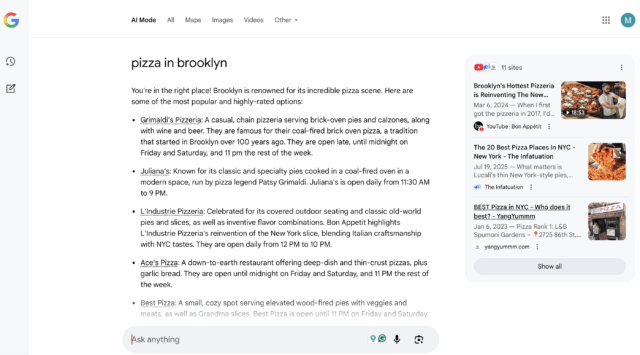
This evolution is moving at breakneck speed. Ben Fisher pointed out:
“We were talking about how ChatGPT was using Apple Maps and Yelp reviews… and then the other day they literally added Google Maps as an option. It’s so much better now.”
What it means for your business: treat AI not as a “nice to watch” tech trend but as an environment you need to optimize for.
Why Google Has the Local AI Advantage
While new AI tools grab headlines, Google has a head start in semantic search, having invested heavily since 2013. Its edge comes from:
- Proprietary data: Google Maps, its knowledge graph, and billions of real-world search interactions.
- Local ecosystem integration: Reviews, location data, and photos all feed into AI-driven results.
- Multiple entry points for visibility: From Maps to AI summaries to voice results, Google gives your business more opportunities to be discovered.
Ben summed it up clearly:
“Just the fact that ChatGPT had to add Google Maps as an option… that’s fantastic. It’s going to bring more search into the ecosystem, which is good for our clients.”
BrightLocal’s Local Search Audit can help you identify exactly how your Google presence is performing, and where gaps could stop you from appearing in these AI-driven experiences.
How to Position Your Business for AI-driven Search
AI models decide what to show based on trust, visibility, and context. To earn your spot, focus on:
- Controlling your narrative: Actively manage online reviews, correct misinformation, and keep your most recent customer sentiment positive.
- Serving consumers first: Offer accurate, helpful, and trustworthy content. AI rewards reliability.
- Avoiding manipulative tactics: Hacks like hidden prompts or deceptive content are short-lived and can get you penalized.
- Shifting focus from links to mentions: High-quality PR, brand mentions, and local citations in credible sources make AI more likely to surface your business.
Ben warned against relying on gimmicks:
“Whatever you think you’re going to learn about optimizing for AI… may end up failing. What worked two months ago didn’t work three months ago. You have to constantly be changing.”
Marie added:
“If you’ve been doing SEO in above-board ways, keep doing that… You’re going to see people trying to trick language models. That’s not going to last for very long, and you can be penalized for it.”
Using BrightLocal’s Reputation Manager, you can track, respond to, and improve your review profile. Reviews are a critical factor in AI’s trust signals and have long been important for building trust regardless.
And don’t forget Citation Builder can help you secure accurate, consistent listings across top directories.
Practical Local SEO Steps to Get AI-ready
Optimizing for AI isn’t just about pleasing Google. It’s about making sure every major AI system can find, trust, and cite your business information correctly.
On the flip side, while content freshness appears to be a major factor, the majority of the existing best local SEO practices will still put you in good standing with AI search engines.
Here’s how to set yourself up for success:
Step 1: Get a Google Business Profile
While this may sound like the first step of any local SEO advice, it’s because it’s such an important one. Google’s AI Overviews and AI Mode both use GBP as their main source of local business information.
In addition, ChatGPT has started using Google Maps as a source. It remains one of the most influential information sources for AI.
Despite this, our research shows that 65% of SMBs say they don’t have a Google Business Profile.
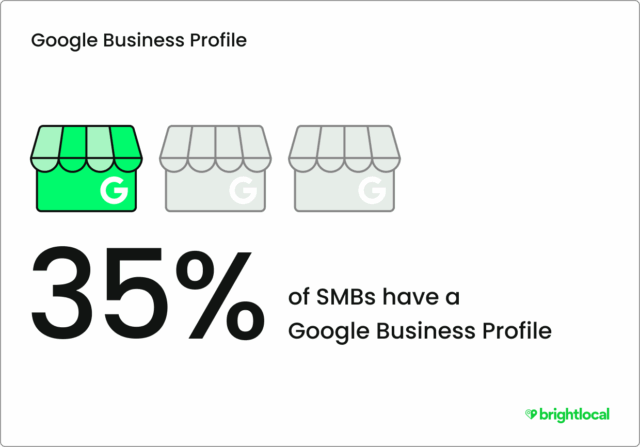
Actions:
- You must create a Google Business Profile.
- Select the best primary category for your business, but make sure you don’t miss any key secondary categories too.
- Add photos and images of your business, then encourage customers to do so too.
Step 2: Optimize for AI’s most trusted citation sources
Our research on how AI search uses listing sources found that large language models (LLMs) pull citations from multiple trusted listings. They then show these sources to users as evidence.
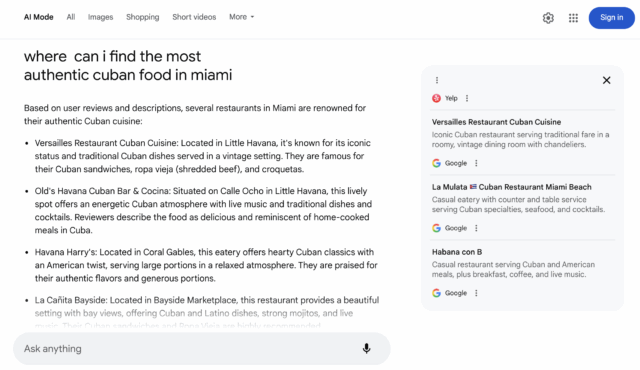
Yelp consistently appears as one of the most frequently cited platforms, even when Google Business Profile is also referenced.
Actions:
- If appropriate for your business, set up a Yelp listing.
- Audit your Yelp listing for accuracy, completeness, and brand consistency. We have advice on Yelp SEO to help.
- Keep categories and descriptions consistent across platforms.
- Upload new photos and images across Google, Yelp, Bing Places, Facebook, Apple Maps, and relevant niche directories.
- Consider using a listing management platform or submitting to data aggregators.
- Align data across all platforms so AI pulls consistent, credible information.
Step 3: Strengthen your review profile
Because Yelp and other review-rich platforms are key AI citation sources, your reviews don’t just influence potential customers. They also train AI models on your brand’s quality and trustworthiness.
The screenshot below shows how Perplexity uses reviews directly in its results.
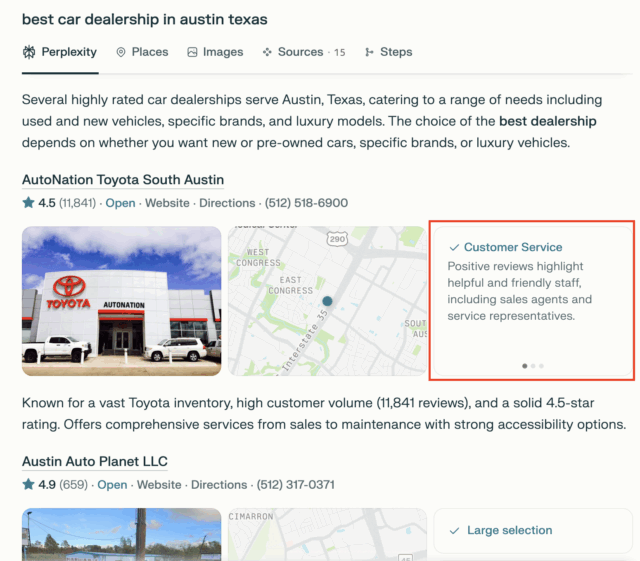
Actions:
- Use Reputation Manager or similar tools to track and respond to reviews across multiple platforms. To save time, consider creating review response templates.
- Encourage satisfied customers to leave detailed reviews on Google and Yelp. Review recency can be a big factor, so this isn’t a one-and-done task.
- Address negative or outdated feedback to correct misinformation before AI picks it up.
Step 4: Build authority through consistent brand signals
AI cross-references multiple listings to verify trust. If your core business information varies from one source to another, it weakens your authority.
Actions:
- Use Citation Tracker to identify and fix inconsistencies in your name, address, phone number, and categories.
- Update high-authority listings first, especially those AI cites most often in your niche.
- Make consistency checks part of your ongoing local SEO checklist.
Download your own Local SEO Checklist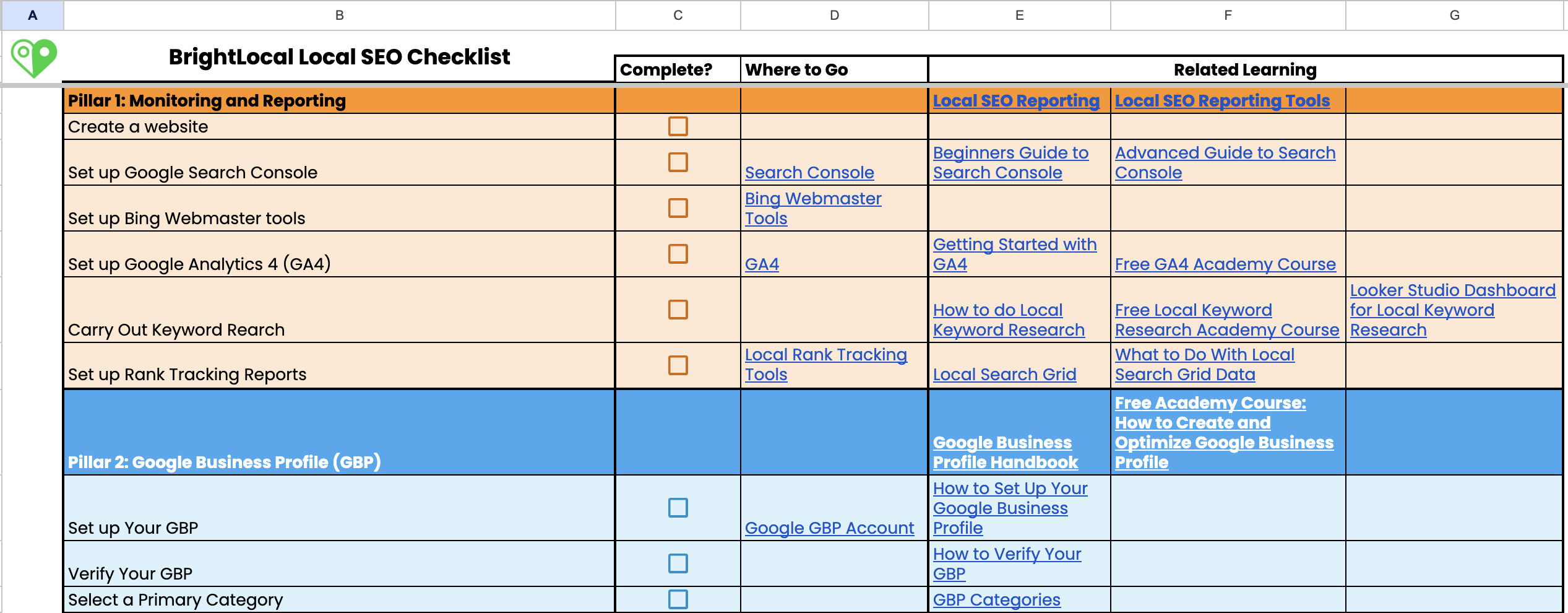 Follow the link below where you can ‘make a copy’ of the sheet.
Follow the link below where you can ‘make a copy’ of the sheet.
Step 5: Publish authoritative, user-focused content
AI tools are more likely to recommend businesses that publish clear, factual, and current content that answers user needs.
Actions:
- Create in-depth service pages, FAQs, and blog content that address common customer queries.
- Add schema markup so AI and search engines can better understand your content. If you need a hand, you can find some local schema templates here.
- Update key pages regularly to keep information accurate and relevant.
Step 6: Monitor how AI currently represents your business
Don’t wait for surprises. Regularly check what AI-powered search tools are saying about you and where they’re getting their data.
Actions:
- Search for your business in ChatGPT, Bing Copilot, Perplexity, and Google’s AI Overview.
- Note which citations appear most often. e.g., Yelp, Google, niche directories.
- Strengthen or correct those sources to ensure AI outputs are accurate.
Bottom line: If Yelp, Google Business Profile, and other authoritative listings tell a strong, consistent story about your business, AI search tools are far more likely to represent you accurately and prominently.
The Next 12 Months: What’s Coming
Expect AI search experiences to become more conversational, more personalized, and more action-oriented. Instead of typing queries into a box, you’ll interact with AI assistants that know your history, preferences, and location.
Marie’s prediction is blunt:
“What we know today will be radically different a year from now… we could do this conversation every month and have so much more to talk about.”
For local businesses, the biggest battleground will be real-world data integration, from location accuracy to review sentiment. Google’s entrenched ecosystem gives it an undeniable lead here.
The Bottom Line
We’re entering an era where SEO isn’t just about ranking for keywords. It’s about earning trust with AI systems.
That means:
- Staying adaptable as AI models evolve.
- Managing your reputation like it’s your most valuable ranking factor.
- Being visible across multiple trusted sources.
As Ben put it:
“At the end of the day, our job is to help with these types of things, because eventually that is how we are going to surface.”
If you can deliver on these, you will not only survive the shift to AI search but thrive in it.